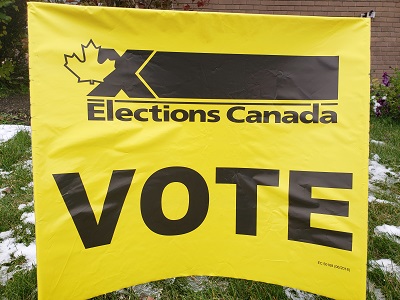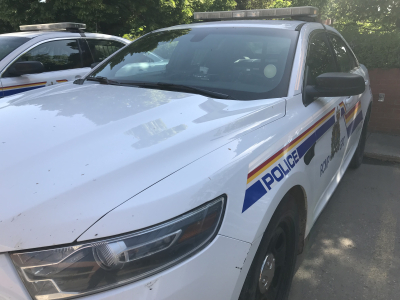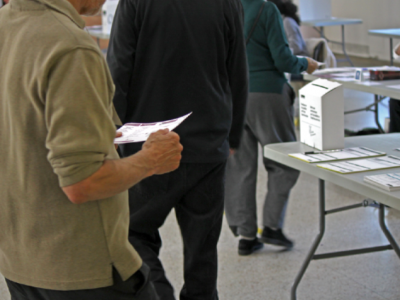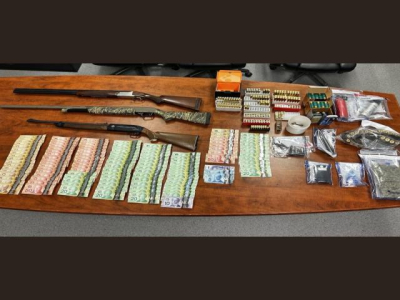 NewsNow
NewsNow
No one can escape Ceto, the Manitoba First Nations Police Service dog.
Ceto helped police make arrests in connections to robberies, a gas theft, and a stolen truck.
On Friday morning, MFNPS noticed a suspect vehicle near Sandy Bay First Nation, going through Amaranth. They notified local RCMP, who tried to stop the truck, but were unsuccessful.
After leading police on a chase through back roads, the driver of the truck lost control and got stuck in a ditch, which made both people in the vehicle make a run for it.
Police set up a perimeter around the area and sent Ceto and the RCMP’s K-9 into the area.
Ceto located the driver in a ditch 6 km away, and the RCMP K-9 found the other suspect.
Both suspects were arrested and taken to Portage, where they await charges for various offences.
- Details
- Contributed by Josh Sigurdson
The results of Manitoba Public Insurance's first-half fiscal year have been released.
MPI has reported a greater net income in the first half of the 2019/20 fiscal year, compared to the 2018/19 fiscal year.
The current net income from the first six months this year is 164.2 million dollars, which is a 91.4 million dollar increase from the same period last year.
Mark Giesbrecht, Vice-president, Finance and Chief Financial Officer for MPI is expecting some of the income to be offset in the winter.
“Historically, there is an increase in claims in the winter months, which offsets the positive financial results typically posted during the first two quarters of the Corporation’s fiscal year. As such, we will continue to closely monitor revenues, claims and claims costs over the remaining two quarters.”
The revenue MPI has earned this year so far is 35.7 million dollars more than the same period last year.
Higher motor vehicle premium revenue because of an increase in the number of motor vehicles insured is what’s raising the revenue, along with the 1.8 per cent increase in Basic insurance rates ordered by the Public Utilities Board that became in effect March 1, 2019.
In June, MPI applied for an increase in Basic insurance premiums for the 2020/21 insurance year by 0.1 per cent, but earlier this month changed the application to a 0.6 per cent decrease due to the favourable year-to-date-results they have.
- Details
- Contributed by Isaac Wihak
The 2019 federal election campaign has been fast-paced and hectic, leaving a lot of Canadians still undecided.
Many people are deciding whether they should vote for the federal party leader or their local candidate.
When you head to the polls today, your ballot will count towards electing a Member of Parliament to represent your constituency in Ottawa, not the federal leader.
If you like a local candidate and not that party’s federal leader, vote for the local candidate, because, if elected, that’s who will be bringing the riding’s concerns to Ottawa.
If you like a federal party leader and not the local candidate, vote for the local candidate that best represents your values and opinions.
A Prime Minister is elected based on the number of seats their party wins. In Canada, a party needs a 170 of 338 seats to form a majority government.
If a party doesn’t reach the required limit of 170 for a majority, a minority government will be formed
Whoever you decide to vote for, make sure you vote for the party that best aligns with your values and priorities.
For information on where to vote, go to the Elections Canada website.
- Details
- Contributed by Josh Sigurdson
With the election campaign just about done, the candidates are sharing their reasons for why you should vote for them.
PPC candidate, Frank Godon says he can get things done in the riding.
“I have an extensive background in working with industry and helping companies come into certain areas and do work that has to be done. Our riding needs this. I promise that I’ll work for the people, work for those in our riding that need it and that’s everybody. That’s not just First Nations, that’s not just people in Dauphin, or Neepawa, or Russell, or any other towns, and not just the farmers. That’s everybody in the riding. I think that I will be the best person to represent them in Ottawa.”
Conservative candidate, Dan Mazier says he entered the race because he wants to be the voice for the riding.
“My past experience with KAP offered me to gain a lot of experience of how government works. I advocated for farmers all across this province and nationally, right across this country, in Ottawa and in the legislature here in Manitoba. I think I have a skill set that can really enhance our way of living or at least get our voice to Ottawa.”
Liberal candidate, Cathy Scofield-Singh says you should vote for her because she knows how people are feeling.
“I meet people where they’re at physically and emotionally, I know the issues my clients face from day to day and see how they struggle to make ends meet. I see the importance of having a national Pharmacare plan, I see the importance of lowering taxes for low and middle-income Manitobans. I will listen to the constituents of Dauphin, Swan River, and Neepawa and make sure their voice is heard. I have a loud voice.”
Christian Heritage Party candidate Jenni Johnson gives her thoughts.
“I’m appealing to the voter who believes his or her vote is more than just a strategic move or an obligatory casting of the ballot for the lesser of 2 or 5 evils. I’m appealing to the voter who cares about the moral integrity of this country and who sees his or her vote as a moral responsibility to vote for someone in good conscience, who’s promising to stand on Canadian values of life and freedom.”
Green Party candidate Kate Storey, says voting for her is a message.
“It’s a message that the parliament has to start thinking about the wellbeing of people and looking forward to the future. Governments are really famous for thinking about 2 days ahead, but governments really have to start thinking about the future.”
NDP candidate Laverne Lewycky says he’s the most experienced, adding he has parliamentary experience.
“I’ve experienced working in committees, in special committees we wrote the special committee report, equality now, which is a special committee on the participation of visible minorities in Canadian societies. I bring that kind of expertise and experience, parliamentary experience.”
Remember to go vote on Monday.
- Details
- Contributed by Isaac Wihak
With hunting season upon us, it’s important for everyone that goes out hunting, to be safe and enjoy themselves.
Hunters should always make sure they have a PAL license and have taken a hunter’s safety course. People who have taken a safety course before don’t have to take one again,
Once out there, you should always act like your gun is loaded, and not point it at anything that you don’t want to shoot. Hunters are also required to wear a hunter orange hat and vest while in the woods.
Hunting is illegal in any National Park but is allowed in a lot of provincial parks. There are some areas in provincial parks where the discharge of a firearm is illegal, so be sure to always check before entering the park.
Hunting on unoccupied crown lands is permitted. If your prey suddenly wanders on to private land, you must ask permission of the owner before continuing to hunt.
After hunting big game, it is required that hunters submit the heads of their prey for testing of Chronic Wasting Disease.
Some big game seasons are already underway, with more to open up soon. For a full list of when seasons open, and for more safety tips and information on CWD testing zones, take a look at this year's hunting guide.
- Details
- Contributed by Josh Sigurdson
Cigarettes in Canada are about to look a whole lot different.
Starting on November 9th, the Government of Canada’s new Tobacco Product Regulation law will standardize the appearance of all tobacco products. The new packaging will be a drab dark brown colour, deemed the “ugliest colour in the world”.
Retailers will have three months to comply with the changes, but some packages are already starting to show up on store shelves.
Under the new law, text style, colour and size, as well as word placement, are all standardized. Packages will also be covered in health warnings
Health Canada says the changes are designed to curb the number of young people who start smoking.
Health Canada stats say that 86 percent of Canadian smokers had their first cigarette by the age of 18, and in 2017, 91,000 Canadians became daily smokers.
The Manitoba Tobacco Reduction Alliance says it hopes that vaping products will receive the same treatment.
The new plain packaging is all part of Canada’s Tobacco Strategy, which is designed to lower tobacco use in Canada to 5 percent by 2035. Tobacco is the leading cause of premature death in Canada.
- Details
- Contributed by Josh Sigurdson
Laverne Lewycky is the NDP’s MP candidate in the federal election.
He says the NDP party has 6 priorities.
“One of the first ones is dealing with healthcare, the second thing is affordable homes, another priority is dealing with the younger people, students and student debt that many of them are facing, another priority is, of course, again young people are really marching hot to trot with this, is the whole idea of dealing with our climate crisis, one of our priorities is that we say it’s time to ensure that the super-wealthy are paying their fair share, and the sixth priority which is really important is cellular internet access.”
Healthcare wise, Lewycky says the bigger points are bringing in universal pharma care, a dental care plan, and he would support having hearing aids included in medicare.
Under the umbrella of affordable housing, Lewycky mentioned the cost of housing is through the roof. He also made the point that work needs to be done for First Nations’ infrastructure and housing to have clean drinking water.
Lewycky says the NDP wants to deal with the weight that is student debt for young people.
For the climate change issue, the NDP wants Canada to be a leader in the fight to deal with it.
Lewycky says they intend to implement a super wealth tax, close tax loopholes and end giveaways for the richest companies and individuals.
He says one of the most important issues for our area is having cell service, adding when he goes past Fork River from Dauphin, he loses service.
Lewycky says he’s been in contact with all 38 municipalities of the constituency and has heard what the municipalities want the MP to do this election. With those municipalities, Lewycky has outlined 8 priorities with each municipality.
The Federal Election is on Monday.
- Details
- Contributed by Isaac Wihak
Kate Storey is the Green Party candidate for the federal election.
She says the green party has a goal to stop favouring corporate profits and work for the wellbeing of Canadians.
“Greens lead the way on the environment, obviously, but we also have a bold economic plan that will create jobs, build the economy, defend human rights and make life more affordable for all.”
Other issues the Green Party is looking to address includes, a federal minimum wage of 15 dollars per hour, bring in guaranteed livable income so everyone has the basics of life and main street businesses can thrive, and they want to get large corporations out of farming so young farmers can afford to buy land.
Storey adds that one of the major issues she’s heard are people starting to worry about climate change.
“We do hear a lot about that. It’s hard to see how it affects our life now, but we can see the kids, they’re striking, they understand the science, and we can understand that it has economic effects that are starting to take effect now. So a lot of people are talking about the future and that’s what the Green Party’s all about.”
Monday, October 21st is Election Day.
- Details
- Contributed by Isaac Wihak
The Christian Heritage Party of Canada’s candidate in the Dauphin-Swan River-Neepawa constituency is Jenni Johnson.
She says their party wishes to address the fundamental direction Canada is headed in.
“More important than the economy and the environment, are Canadian values that we think we’re drifting further and further away from. Namely, that’s the value and importance of life and the protection of individual freedom.”
Johnson says the biggest issue she hears are people feeling like the government is too involved in their everyday life.
“I call it government overreach. You don’t have to look too far to find somewhere where the government has had some sort of say, regulation, or limitation put on the way we live our everyday life. That’s an issue I would want to address. I would always vote towards a smaller government that puts not only money back in people’s pockets, but power back in people’s hands. So they can farm the way they want to farm, run their businesses the way they want to run their businesses, and more importantly, parent their children the way they want to parent their children.”
This upcoming Monday, October 21st is Election Day.
- Details
- Contributed by Isaac Wihak
Cathy Scofield-Singh is running in the federal election for the Liberal Party. She says one of the main things her party wants to address is to keep moving forward.
“We need to get in place a national pharma care plan, we need to improve mental health support, and we need to put more money into the pockets of Canadians. We need to continue addressing getting clean drinking water, not just for the first nations but for the metis and for all the rural Manitobans, whose infrastructure is now crumbling. We need to get them upgraded and replaced, which will create new jobs for people, which will put more money into their pockets again, which more money into the municipalities, which puts more money into the governments.”
One main issue Scofield-Singh has been hearing from seniors, low and middle-income Canadians is a national pharma care plan.
“It’s difficult for them when they have to decide between paying for their bills or paying for medication. They know that when they aren’t healthy it affects their overall pocketbook, health, and emotionally and physically. Having more money in their pockets is a big thing as well as growing the economy.”
The election date is next Monday, October 21st.
- Details
- Contributed by Isaac Wihak
The Conservative Party candidate in the Dauphin-Swan River-Neepawa riding is Dan Mazier.
He says the Conservative’s campaign has been focused on making life more affordable for Canadians.
Mazier has a few ideas on what he’d like to get addressed if elected.
“There are 3 categories that I am focusing on and what I keep hearing about in the riding as I door knock and meet people. It’s affordability, looking after small businesses and businesses in general, and agriculture.”
Agriculturally, he wants to make sure the concerns from the riding make it to Ottawa.
To make things more affordable, Mazier wants to address fixed income for seniors and the lower-income areas.
Mazier also says protecting the environment is a big issue.
This upcoming Monday, October 21st is Election Day.
- Details
- Contributed by Isaac Wihak

















